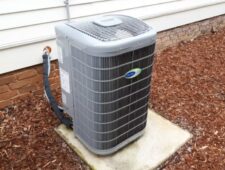 Heat Pumps in Washington Grove
Heat Pumps in Washington Grove
We know a large portion of GHG emissions is attributed to heating and cooling in Montgomery County, primarily due to residential reliance on natural gas furnaces and boilers. In Washington Grove, we rely on fuel oil and propane, which are less efficient and produce even more emissions. From our town surveys, we’ve learned that about 40% of houses in the Grove use fuel oil, 12% use propane gas and, because the gas line was never developed, only a couple use natural gas. However, about 35% of our homes have added or converted to electric heat pumps as their primary heat source.
Heat pumps are considerably more efficient than heating oil, natural gas, and propane-fired furnaces and boilers; reduce heating costs; and emit considerably less GHGs. For homes with electric heat pumps that have also elected to purchase zero emitting renewable electricity (from either the Maryland Electric Choice program or community solar electricity providers), GHGs are next to zero when using an electric heat pump, and electricity costs per kilowatt hour are also lower.
Because heat pumps are 2-3 times more efficient than fossil fuel systems, lifetime costs of heating are much lower and can result in simple paybacks (i.e., the number of years when the money saved after the renovation will cover the investment) of as little as 1-2 years depending on the system. Even relying on Pepco’s not-so-clean power generation, heat pumps reduce GHG emission by a factor of six over fuel oil.
State and Local Changes are Coming
The state of Maryland has just established a statutory goal of reducing GHG emissions by 60% from 2006 levels by 2030. Montgomery County is even more aggressive at 80% by 2027. This includes converting most residences to heat pumps.
Because of this widespread push in Maryland to heat pumps, there is potential benefit in terms of desirability and asset value to those houses in the Grove and surrounding areas that convert relative to houses that do not. As comparable houses get more efficient and fuel prices fluctuate, keeping our own unique and historic houses viable for modern family living will likely mean updating to systems that meet these expectations.
How Does a Heat Pump Work?
Much the same way as an air conditioner or refrigerator works for cooling, heat pumps work for cooling, and work in reverse for heating as well. By condensing and evaporating a refrigerant gas within the system, heat pumps actually “move” or transfer heat into or from the living space as needed. With standard heat pumps, the efficiency decreases as it gets either warmer or colder necessitating back-up, but overall remains more efficient than an oil or propane furnace. Newer designs no longer need that back up. The three basic types of heat pumps are air-source, ground source, and ductless minisplits.
Grove Systems
The most common type of heating system in the Grove is a furnace that distributes warm air through ducts to the rooms of a house. The furnace can be either fuel oil, propane or even electric. Another common system is an oil boiler that distributes warm water through standing or baseboard radiators to the rooms of the house. A third system consists of electric baseboard radiators in each room. And of course, there are combinations of these systems.
Heat Pump Information Series
The way to integrate heat pumps into each type of system will vary from “replacement” to “augmentation”, and over the next few bulletins, we will share what we have learned for each system. We will devote one bulletin article to each conversion type and cover common questions about when is it best to introduce a heat pump, what to consider for each system, what are the costs, benefits and paybacks, what are the trade-offs and lifetimes, and what incentives are currently available.
